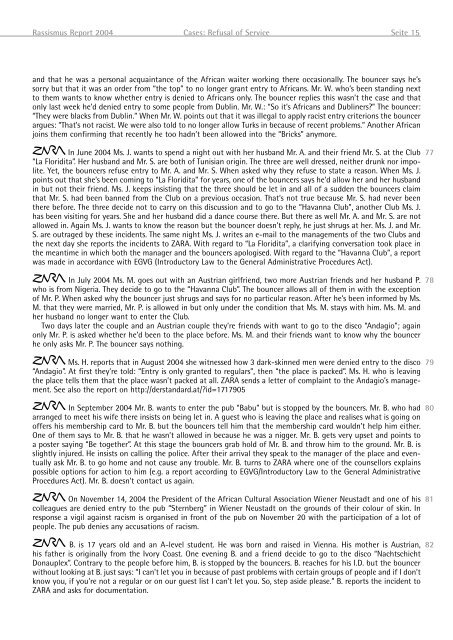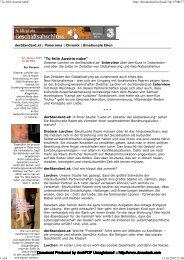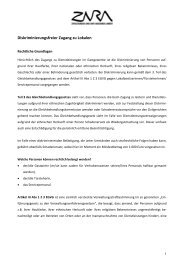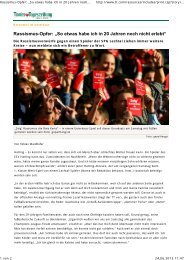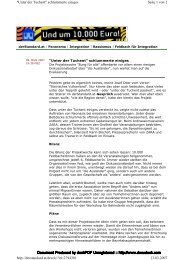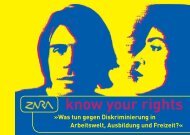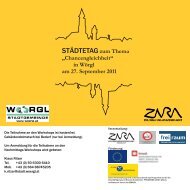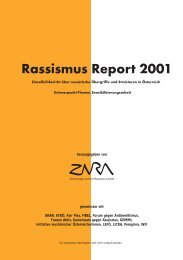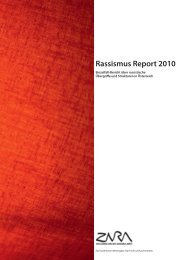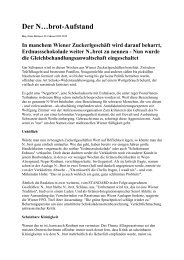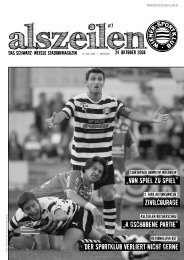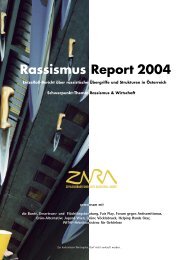"Racism Report 2004" is available for free - Zara
"Racism Report 2004" is available for free - Zara
"Racism Report 2004" is available for free - Zara
- TAGS
- zara
- zara.or.at
Create successful ePaper yourself
Turn your PDF publications into a flip-book with our unique Google optimized e-Paper software.
Rass<strong>is</strong>mus <strong>Report</strong> 2004 Cases: Refusal of Service Seite 15<br />
and that he was a personal acquaintance of the African waiter working there occasionally. The bouncer says he’s<br />
sorry but that it was an order from “the top” to no longer grant entry to Africans. Mr. W. who’s been standing next<br />
to them wants to know whether entry <strong>is</strong> denied to Africans only. The bouncer replies th<strong>is</strong> wasn’t the case and that<br />
only last week he’d denied entry to some people from Dublin. Mr. W.: “So it’s Africans and Dubliners?” The bouncer:<br />
“They were blacks from Dublin.” When Mr. W. points out that it was illegal to apply rac<strong>is</strong>t entry criterions the bouncer<br />
argues: “That’s not rac<strong>is</strong>t. We were also told to no longer allow Turks in because of recent problems.” Another African<br />
joins them confirming that recently he too hadn’t been allowed into the “Bricks” anymore.<br />
In June 2004 Ms. J. wants to spend a night out with her husband Mr. A. and their friend Mr. S. at the Club 77<br />
��������������������������������������<br />
“La Floridita”. Her husband and Mr. S. are both of Tun<strong>is</strong>ian origin. The three are well dressed, neither drunk nor impolite.<br />
Yet, the bouncers refuse entry to Mr. A. and Mr. S. When asked why they refuse to state a reason. When Ms. J.<br />
points out that she’s been coming to “La Floridita” <strong>for</strong> years, one of the bouncers says he’d allow her and her husband<br />
in but not their friend. Ms. J. keeps ins<strong>is</strong>ting that the three should be let in and all of a sudden the bouncers claim<br />
that Mr. S. had been banned from the Club on a previous occasion. That’s not true because Mr. S. had never been<br />
there be<strong>for</strong>e. The three decide not to carry on th<strong>is</strong> d<strong>is</strong>cussion and to go to the “Havanna Club”, another Club Ms. J.<br />
has been v<strong>is</strong>iting <strong>for</strong> years. She and her husband did a dance course there. But there as well Mr. A. and Mr. S. are not<br />
allowed in. Again Ms. J. wants to know the reason but the bouncer doesn’t reply, he just shrugs at her. Ms. J. and Mr.<br />
S. are outraged by these incidents. The same night Ms. J. writes an e-mail to the managements of the two Clubs and<br />
the next day she reports the incidents to ZARA. With regard to “La Floridita”, a clarifying conversation took place in<br />
the meantime in which both the manager and the bouncers apolog<strong>is</strong>ed. With regard to the “Havanna Club”, a report<br />
was made in accordance with EGVG (Introductory Law to the General Admin<strong>is</strong>trative Procedures Act).<br />
In July 2004 Ms. M. goes out with an Austrian girlfriend, two more Austrian friends and her husband P. 78<br />
��������������������������������������<br />
who <strong>is</strong> from Nigeria. They decide to go to the “Havanna Club”. The bouncer allows all of them in with the exception<br />
of Mr. P. When asked why the bouncer just shrugs and says <strong>for</strong> no particular reason. After he’s been in<strong>for</strong>med by Ms.<br />
M. that they were married, Mr. P. <strong>is</strong> allowed in but only under the condition that Ms. M. stays with him. Ms. M. and<br />
her husband no longer want to enter the Club.<br />
Two days later the couple and an Austrian couple they’re friends with want to go to the d<strong>is</strong>co “Andagio”; again<br />
only Mr. P. <strong>is</strong> asked whether he’d been to the place be<strong>for</strong>e. Ms. M. and their friends want to know why the bouncer<br />
he only asks Mr. P. The bouncer says nothing.<br />
Ms. H. reports that in August 2004 she witnessed how 3 dark-skinned men were denied entry to the d<strong>is</strong>co 79<br />
��������������������������������������<br />
“Andagio”. At first they’re told: “Entry <strong>is</strong> only granted to regulars”, then “the place <strong>is</strong> packed”. Ms. H. who <strong>is</strong> leaving<br />
the place tells them that the place wasn’t packed at all. ZARA sends a letter of complaint to the Andagio’s management.<br />
See also the report on http://derstandard.at/?id=1717905<br />
In September 2004 Mr. B. wants to enter the pub “Babu” but <strong>is</strong> stopped by the bouncers. Mr. B. who had 80<br />
��������������������������������������<br />
arranged to meet h<strong>is</strong> wife there ins<strong>is</strong>ts on being let in. A guest who <strong>is</strong> leaving the place and real<strong>is</strong>es what <strong>is</strong> going on<br />
offers h<strong>is</strong> membership card to Mr. B. but the bouncers tell him that the membership card wouldn’t help him either.<br />
One of them says to Mr. B. that he wasn’t allowed in because he was a nigger. Mr. B. gets very upset and points to<br />
a poster saying “Be together”. At th<strong>is</strong> stage the bouncers grab hold of Mr. B. and throw him to the ground. Mr. B. <strong>is</strong><br />
slightly injured. He ins<strong>is</strong>ts on calling the police. After their arrival they speak to the manager of the place and eventually<br />
ask Mr. B. to go home and not cause any trouble. Mr. B. turns to ZARA where one of the counsellors explains<br />
possible options <strong>for</strong> action to him (e.g. a report according to EGVG/Introductory Law to the General Admin<strong>is</strong>trative<br />
Procedures Act). Mr. B. doesn’t contact us again.<br />
On November 14, 2004 the President of the African Cultural Association Wiener Neustadt and one of h<strong>is</strong> 81<br />
��������������������������������������<br />
colleagues are denied entry to the pub “Sternberg” in Wiener Neustadt on the grounds of their colour of skin. In<br />
response a vigil against rac<strong>is</strong>m <strong>is</strong> organ<strong>is</strong>ed in front of the pub on November 20 with the participation of a lot of<br />
people. The pub denies any accusations of rac<strong>is</strong>m.<br />
B. <strong>is</strong> 17 years old and an A-level student. He was born and ra<strong>is</strong>ed in Vienna. H<strong>is</strong> mother <strong>is</strong> Austrian, 82<br />
��������������������������������������<br />
h<strong>is</strong> father <strong>is</strong> originally from the Ivory Coast. One evening B. and a friend decide to go to the d<strong>is</strong>co “Nachtschicht<br />
Donauplex”. Contrary to the people be<strong>for</strong>e him, B. <strong>is</strong> stopped by the bouncers. B. reaches <strong>for</strong> h<strong>is</strong> I.D. but the bouncer<br />
without looking at B. just says: “I can’t let you in because of past problems with certain groups of people and if I don’t<br />
know you, if you’re not a regular or on our guest l<strong>is</strong>t I can’t let you. So, step aside please.” B. reports the incident to<br />
ZARA and asks <strong>for</strong> documentation.


